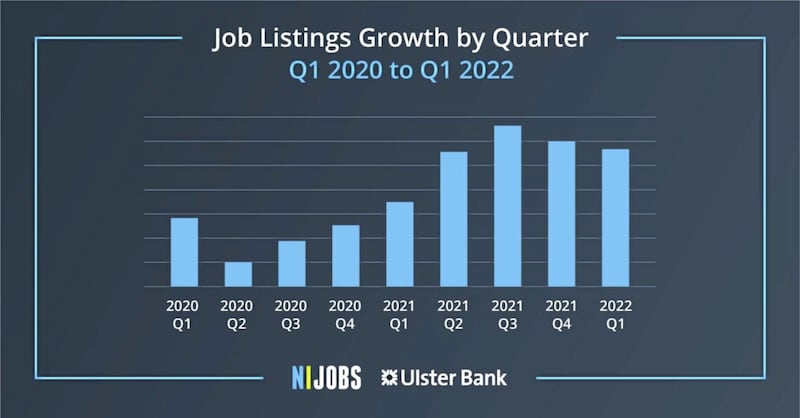THE north’s labour market is rebalancing following the post-lockdown recruitment surge in the second half of last year, a new report suggests.
NIJobs.com said listings on its platform dropped four per cent in the first three months of 2022, with the total 14 per cent below the high water mark of the third quarter (Q3) of 2021.
But demand for staff remains extremely high, with listings in Q1 2022 61 per cent higher than the same period last year and 68 per cent up on pre-pandemic levels.
And the recruitment website said demand for skills in certain roles is continuing to exceed supply, with software engineers, developers, project managers and business analysts among the most in-demand professional roles throughout the first quarter of the year.
Jobseeker activity also remains high, with the cost-of-living squeeze and a post-pandemic career re-evaluation prompting job hunting.
In a further sign that the labour market is re-adjusting to a post-pandemic period, retail, hospitality and healthcare posted the biggest drop in listings in Q1 2022.
But two-thirds of the 31 employment categories still saw more positions advertised over the quarter.
The biggest increase between Q4 2021 and Q1 2022 came in sales positions; secretarial/admin and in the charity and not for profit sector.

Sam McIlveen, general manager at NIJobs.com said rising inflation and the widespread adoption of hybrid working models means flexibility is increasingly crucial for employers.
“People have changed and so too must the recruitment process. Introducing a framework of flexibility is key to support current and future hiring needs.”
He said while hybrid models can offer savings on city centre premises and broader talent pools, the demand for certain skills is driving higher salaries and encouraging employers to adopt new practices and other perks in order to stand out.
Analysing the latest dataset, Ulster Bank’s chief economist Richard Ramsey, said: “Hiring amongst employers has continued at a robust pace, albeit the volume of job listings is down on the previous two quarters.
“This moderation is not unexpected as businesses acclimatise to the post-lockdown world and the end of stop-start restrictions. “
He said ten categories recorded the highest number of listing since the series began.
Despite these latest declines, the ‘nursing, healthcare and medical’ category is still number one for the number of vacancies, accounting for one-in-six roles listed on NIJobs.com.
Hospitality is now third, overtaken by IT.
“The cost-of-living crisis will act as a further incentive for people to change jobs if such a move means securing a higher salary,” said Mr Ramsey.
“This makes it challenging for employers who will be increasingly under pressure to pay more to retain staff as well as attract new talent.”







